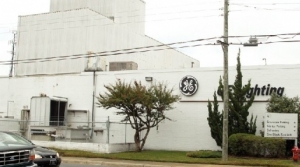GE plant closing
By Steve Herring
Published in News on October 28, 2010 1:46 PM

News-Argus/BOBBY WILLIAMS
GE Lighting officials Wednesday morning announced the company\'s intent to close the Goldsboro plant by October of the next year. The plant, located at 900 N. George St., has operated in Goldsboro since 1946 and currently has 45 employees.
Employees at the GE Lighting Carolina Products plant learned Wednesday that before this time next year, they will likely have to find new jobs.
According to a company press release, the plant, which has operated in Goldsboro since 1946, employs 41 hourly and four salaried workers.
Information provided by GE was unclear as to when the plant would be shuttered in 2011. GE officials also did not say if all employees would leave at the same time or whether jobs would be phased out over a period of time.
"The intent is to close. That means it is not a done deal at this time," GE communications manager Janice Fraser said in a telephone interview.
If that decision is made, then the plant would close by the end of October 2011, she said.
Also, at this time there are no plans to phase out the jobs prior to the closure, Ms. Fraser said. However, that does not mean that employees won't take advantage of various retirement benefits and leave early, she said.
Word of the closing began circulating Wednesday and initial speculation indicated that the plant would close this Friday.
That is not the case, Ms. Fraser said.
What people might have been referring to were plans to transfer work at the plant to other GE facilities, she said. She did not specify which plants or their locations.
Ms. Fraser said the decision was made in April 2009 to transfer those jobs beginning this Friday. She said she is unsure how the intent to close the plant will affect the transfer.
Transferring the jobs as planned would leave only 19 employees at the plant leaving it unable to be sustained, she said.
The plant, located at 900 N. George St., makes lead wires for light bulbs -- primarily for incandescent bulbs. In those bulbs, the lead wires provide the electrical connection to the filament inside the bulb.
A new federal law requires that that incandescent bulbs be phased out starting with 100-watt bulbs in 2012 ending with the 40-watt bulbs in 2014. All light bulbs must use 25 to 30 percent less energy by 2014 increasing to 70 percent by 2020.
The announcement was not unexpected.
"We hate to see them go," said Mike Haney, existing industry specialist for the Wayne County Economic Development Alliance. "This intent of closure of the plant in 2011 does not come as a surprise, but obviously we are disappointed when we have a corporate partner leaving us. We have been looking at this for four years."
Plant manager Patrick Peterson said in the press release that the employees will have the opportunity to participate in an "idea generation" process of up to 60 days to offer alternatives to closing the facility.
Should the decision still be to close the plant, employees will be eligible for a "wide range" of benefits including retirement options for those who meet certain age and service requirements, he said.
Peterson said the benefits would include GE pensions, continued medical and dental benefits, thousands of dollars in tuition refunds for education and retraining and preferential hiring opportunities at other GE facilities.
"Volume for incandescent lighting products is declining as customers choose more energy-efficient light sources and as time draws nearer to 2012 when energy legislation, setting higher-efficient standards, will begin to eliminate higher-wattage incandescent bulbs," he said. "Less incandescent bulbs means less components are needed for them."
He said the proposal to close the plant and to consolidate wire components manufacturing at other GE plants addressed decreases in volume and the need to improve the company's cost competitiveness.
"For our Goldsboro plant, having so few employees, along with declining volume, makes it difficult to sustain this operation into the future," Peterson said.
